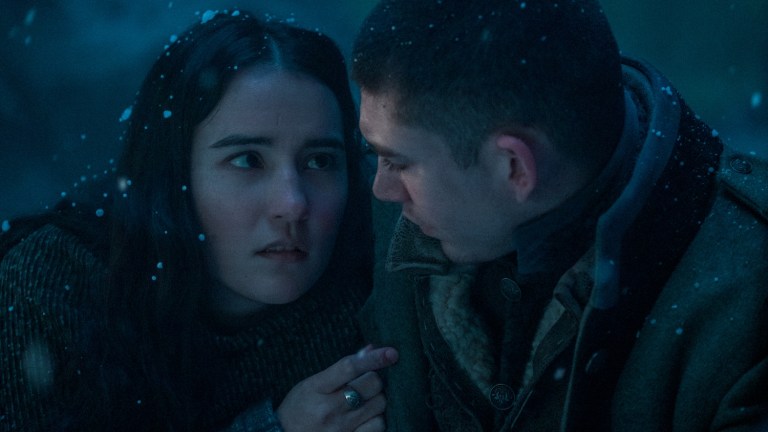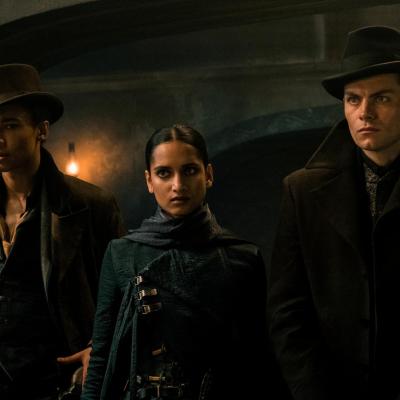Shadow and Bone’s Best Change From the Books is Mal & Alina’s Relationship
Mal is one of the weakest characters in the Grishaverse book series. In Netflix's Shadow and Bone adaptation, his relationship with Alina is the show's foundation.

This Shadow and Bone article contains spoilers.
Netflix’s Shadow and Bone is a sweeping fantasy epic that includes everything from an elite magical subclass (Grisha) that can manipulate the matter in surrounding elements and physical material, to a war-torn kingdom struggling to destroy a growing swath of literal darkness, and a girl whose heretofore undiscovered abilities just might be the key to changing the world. It’s also a story that’s unabashedly romantic in every sense of the word, firmly grounding its central narrative in complex human connections rather than Grisha magical castes or other more distinctly fantasy-oriented themes and tropes.
Shadow and Bone takes particular care with all its central relationships, whether they’re between potential love interests, long-time friends, or something in between. The Netflix series builds on the foundation laid in Leigh Bardugo’s Grishaverse novels, crafting a fully-realized fantasy realm populated with the sort of rich, complex love stories and friendships that remind us why our protagonists are so willing to keep fighting for a world that has thus far given them such little reason to hope for a better future.
Nowhere is this shift more evident than the way in which Shadow and Bone builds and improves upon the relationship between central heroine Alina Starkov and her best friend Malyen Oretsev. A pair of childhood best friends who seem on the cusp of becoming something more now that they are young adults, the duo have shared everything together. From growing up in an orphanage to joining the army, their lives are forever intertwined in a complex and meaningful way, and their interactions reflect that fact. (Plus, they are truly and genuinely adorable together.)
From the series’ opening scenes, we learn that Alina and Mal’s relationship is the crux around which almost everything else in Shadow and Bone will turn. The pair is both the lens through which we are introduced to this fantasy world and the first relationship we are asked to believe in. And in a story full of twists and increasingly deadly threats, their connection becomes an important and necessary constant.
More importantly, the show does the work of binding these two to one another emotionally, without ever making it feel as though their connection takes place simply because it also happens to exist in Bardugo’s novels. Shadow and Bone adds some much-needed depth and dimension to both characters by shaking up their histories. Unlike the novels, in the Netflix series, both Mal and Alina are mixed-race—part Ravkan, and part Shu-Han (in real life, Alina actress Jessie Li Mei is a Chinese-British actress, while Mal actor Archie Renaux is White English)—two countries that have long been at war with one another. Both would likely have been ostracized enough for the simple fact of being orphans with no real wealth or prospects to speak of, but their mixed-race status makes them even more obvious targets for the ire of those around them.
Both Alina and Mal are mocked as “half breeds” at their orphanage, called “rice eaters” and bullied by their peers. Their army camp is covered in wartime propaganda posters that depict their Shu Han enemies as uncomfortably angry, vaguely racist caricatures, and even the other soldiers in Alina’s squad of cartographers make rude comments about how she doesn’t belong with them.
This new backstory not only adds new depth to Alina as a character, but it further underlines why she and Mal are so important to one another – he’s not just her friend, he’s the one person in her regiment, and one of the few in a predominantly White Ravka, who really understands her and who shares her experiences at a base cultural level. It explains why they’re so loath to be apart, and why each fights so hard to get back to the other whenever they’re separated.
In the sort of small-but-significant shifts from the book narrative that come to define this series adaptation, it is the order to send Mal’s regiment across the Shadow Fold that spurs Alina to find a way to accompany him, costing several of her unit their lives and ultimately unleashing her Grisha abilities. (In the novel, they’re both simply assigned to the skiff that is sent across the Shadow Fold.) It is the first example of a trend that will run throughout the series, in which so many of both Alina and Mal’s decisions will be defined by the other’s presence or absence and motivated by the fact that neither can bear to lose the other.
Shadow and Bone also manages to flesh out Mal himself as a character in a way that the book series does not. Since Bardugo’s novels are told from a first-person perspective—Alina’s—we necessarily spend much less time with Mal in the book version of Shadow and Bone than we do in the Netflix series. This means that he’s technically absent for half the story in the book and, as a result, often feels bland and underdeveloped when compared to other characters who don’t disappear for huge swaths of the novel.
The television series instead allows us to get to know Mal as a person who exists separate and apart from his relationship with Alina—instead of simply disappearing, we now see what happens to Mal after Alina is whisked off to the Little Palace, and are allowed to watch his realization of his true feelings for his best friend take place in something like real-time. Though their letters to each other both go missing before either can read them (thanks a lot, Genya!), we as viewers still get to hear both sets ourselves and witness the growth that takes place—for each of them—during their time apart.
Often in YA fiction, a designated couple either is or ultimately gets together simply because they’re the designated couple and that’s what happens in a story like this. But Shadow and Bone is extra careful to not just give us the reasons that Mal and Alina might choose one another, but to show us that is their relationship is utterly central to the story the show is telling—and that it makes that story better and stronger than it otherwise ever might be. In Bardugo’s novels, we may all wonder whether Alina ought to be with the Darkling. But in this version of Shadow and Bone, it feels as though she couldn’t ever choose anyone other than Mal.


